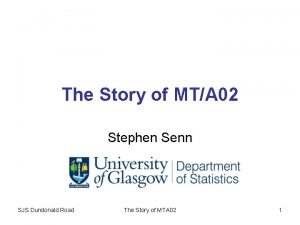ELTINGA Centre for Real Estate Research and MTA
















- Slides: 16

ELTINGA Centre for Real Estate Research and MTA KRTK KTI Office Market Turning Points in the Financial Crisis Áron Horváth Gábor Révész ERES Istanbul 26 June, 2015

Office market turning points in the Crisis – on average

Office market turning points during the Crisis § An approximately one-year lag is calculated between office market yield and new supply. § A somewhat shorter distance of rents and yields is revealed. § According to the concluded calculations, vacancy and take-up respond after the yield. § At the beginning of the crisis, take-ups followed the downward movement of yield somewhat later than at the recovery. § A larger gap can be seen between take-ups and vacancies during the recovery.

Presentation plan 1. Lead-lag correspondences of office market indicators. 2. Turning point method. 3. Results.

1. LEAD-LAG CORRESPONDENCES OF OFFICE MARKET INDICATORS

Lead-lag on the office market § Time-lag is consequential of numerous factors. § Economists look for general lessons to learn. § Results are important for practical forecasting purposes. § Rent is referred as sticky because of living and valid contracts. § New supply needs time to be constructed.

2. TURNING POINT METHOD

Turning point identification Local maximum, minimum and turning points for Brussels office rents

Turning point identification § Data series of more than 80 cities from Europe and Asia. § Local maximum and minimum points were identified. § Among local maximums and minimums, turning points are selected. § The series were broken down to upturns and downturns. How many days on average do the turning points of indicators follow the turning point in yields during the Great Financial Crisis?

Turning point identification Local maximum, minimum and turning points for Berlin new supply / stock ratio.

3. RESULTS

Reaction lags (in days) yield take-up/ stock ratio vacancy rent new supply/ stock ratio beginning of the downturn 0 96 105 297 340 end of the downturn 0 42 145 213 304 § An approximately one-year lag is calculated between office market yield and new supply. § A somewhat shorter distance of rents and yields is revealed. § According to the concluded calculations, vacancy and take-up respond earliest.

Reaction asymmetries yield take-up/ stock ratio vacancy rent new supply/ stock ratio beginning of the downturn 0 96 105 297 340 end of the downturn 0 42 145 213 304 § At the beginning of the crisis, take-ups followed the downward movement of yield somewhat later than at the recovery. § A larger gap can be seen between take-ups and vacancies during the recovery. § The reaction of Supply is shorter to some extent during the upturn.

Serial correlations § Correlations of cyclical components with yields supported the turning point method’s results. § First take-ups react, than vacancy, and new supply in the end.

(Conclusion) Further research § Robustness check. § Forecast performance focusing on completion. § Cross sectional explanatory factors of the distances.

Thank you for your attention! Visit our website at eltinga. hu
 11245 lantern road fishers in 46038
11245 lantern road fishers in 46038 Centroid formula
Centroid formula Center of gravity
Center of gravity Security fundamentals practice test
Security fundamentals practice test Urban economics and real estate markets
Urban economics and real estate markets Florida real estate principles practices & law
Florida real estate principles practices & law Chapter 11 real estate and other investments
Chapter 11 real estate and other investments Business service center mta
Business service center mta Precision optical lab
Precision optical lab Bts mta
Bts mta Bts mta
Bts mta Ericsson mta 1956
Ericsson mta 1956 Assa twin combi key cutting
Assa twin combi key cutting Mta
Mta Tera mta
Tera mta Ortho mta
Ortho mta Mta classification
Mta classification






























